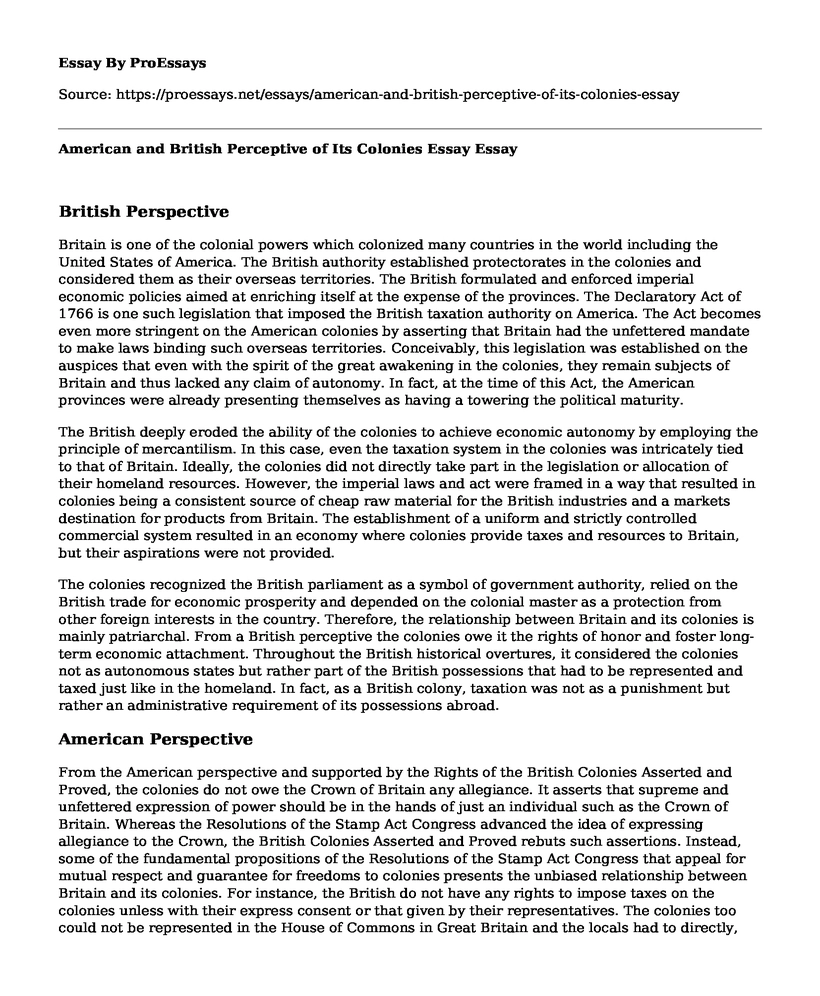British Perspective
Britain is one of the colonial powers which colonized many countries in the world including the United States of America. The British authority established protectorates in the colonies and considered them as their overseas territories. The British formulated and enforced imperial economic policies aimed at enriching itself at the expense of the provinces. The Declaratory Act of 1766 is one such legislation that imposed the British taxation authority on America. The Act becomes even more stringent on the American colonies by asserting that Britain had the unfettered mandate to make laws binding such overseas territories. Conceivably, this legislation was established on the auspices that even with the spirit of the great awakening in the colonies, they remain subjects of Britain and thus lacked any claim of autonomy. In fact, at the time of this Act, the American provinces were already presenting themselves as having a towering the political maturity.
The British deeply eroded the ability of the colonies to achieve economic autonomy by employing the principle of mercantilism. In this case, even the taxation system in the colonies was intricately tied to that of Britain. Ideally, the colonies did not directly take part in the legislation or allocation of their homeland resources. However, the imperial laws and act were framed in a way that resulted in colonies being a consistent source of cheap raw material for the British industries and a markets destination for products from Britain. The establishment of a uniform and strictly controlled commercial system resulted in an economy where colonies provide taxes and resources to Britain, but their aspirations were not provided.
The colonies recognized the British parliament as a symbol of government authority, relied on the British trade for economic prosperity and depended on the colonial master as a protection from other foreign interests in the country. Therefore, the relationship between Britain and its colonies is mainly patriarchal. From a British perceptive the colonies owe it the rights of honor and foster long-term economic attachment. Throughout the British historical overtures, it considered the colonies not as autonomous states but rather part of the British possessions that had to be represented and taxed just like in the homeland. In fact, as a British colony, taxation was not as a punishment but rather an administrative requirement of its possessions abroad.
American Perspective
From the American perspective and supported by the Rights of the British Colonies Asserted and Proved, the colonies do not owe the Crown of Britain any allegiance. It asserts that supreme and unfettered expression of power should be in the hands of just an individual such as the Crown of Britain. Whereas the Resolutions of the Stamp Act Congress advanced the idea of expressing allegiance to the Crown, the British Colonies Asserted and Proved rebuts such assertions. Instead, some of the fundamental propositions of the Resolutions of the Stamp Act Congress that appeal for mutual respect and guarantee for freedoms to colonies presents the unbiased relationship between Britain and its colonies. For instance, the British do not have any rights to impose taxes on the colonies unless with their express consent or that given by their representatives. The colonies too could not be represented in the House of Commons in Great Britain and the locals had to directly, without interference or compulsion elect their leaders who will determine and levy taxes on the people.
With the perception that the taxes collected from the colonies were gifts from the territories, the Resolutions of the Stamp Act Congress provided that no such free property should be rendered to the Majesty since it contradicted the spirit of the British constitution. While the British had imposed specific restrictive trade acts, the Resolutions of the Stamp Act Congress framed them as not only impractical but also burdensome. The colonies do not have to exercise or enjoy freedoms, prosperity, and happiness at the behest of the British since the Resolutions of the Stamp Act Congress recognized these ideas as being critical to the socio-economic and political progress of the colonies.
Contrary to the patriarchal British perceptive of its colonies, the Resolutions of the Stamp Act Congress established a critical aspect of mutualism in the interactions between the British and its colonies. The Americans Conceive acts impose on colonies by the British as a clear expression of subterfuge and enslavement. According to them, the taxes, regulations, and duties imposed on the colonies were deliberately designed to not only advance the British imperialism over overseas colonies but also centralize its administration. The plot by the British to run the colonies profitably epitomized a sinister plan to suppress the liberty of the colonies hence unwelcomed. Therefore, the colonist argued that they had no elected members to the House of Commons in Britain thus did not surrender their mandate to any representatives. The move to tax them then was an attempt to impose financial obligation without an actual representation.
Cite this page
American and British Perceptive of Its Colonies Essay. (2022, Aug 15). Retrieved from https://proessays.net/essays/american-and-british-perceptive-of-its-colonies-essay
If you are the original author of this essay and no longer wish to have it published on the ProEssays website, please click below to request its removal:
- American Horizons Questions Paper Example
- Abraham Lincoln's Emancipation Proclamation: The Turning Point of the Civil War - Essay Sample
- Essay Sample on Canada's Floods: A Growing Risk and Government Responsibility
- Research Paper on Indigenous People in Canada: Growing Population and Challenges
- Essay Example on Power: Use, Abuse, Influence and Sources of Authority
- Essay Example on Troy Maxson: A Man of Strength, Hard Work, and Imagination
- Slavery - Free Essay Sample







